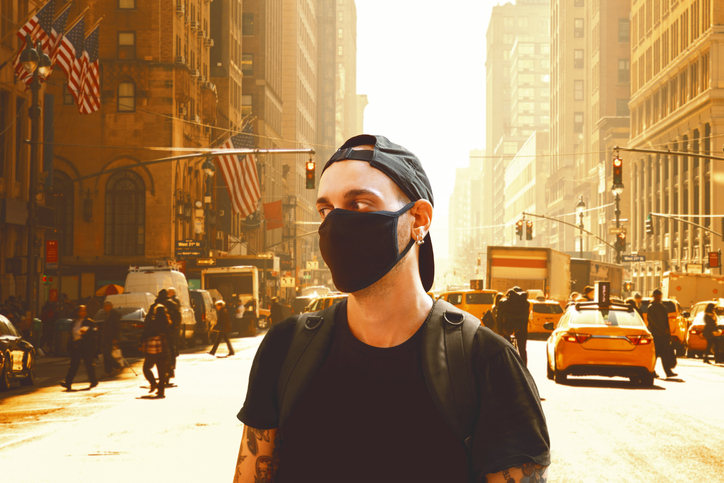 By Dr. Claire Green-Forde, LCSW
Executive Director, National Association of Social Workers-NYC Chapter
By Dr. Claire Green-Forde, LCSW
Executive Director, National Association of Social Workers-NYC Chapter
New York currently holds a title no city or state in America wants – the epicenter of the Coronavirus Disease (COVID-19) crisis.
As social workers we are watching everyday, worried that our loved ones, colleagues, friends, or clients could fall ill with the ensuing complications of COVID-19 or even lose their lives . We see and hear the inconsolable cries of our loved ones and our clients. We hear the confusion and bear witness to the chaos as we too are caught in the panic. We try to help others while dealing with the inadequate resources in our public health and social care systems that were strained before this crisis, and are disappearing now.
The National Association of Social Workers-NYC Chapter (NASW-NYC) knows that social workers are a vital resource both in our healthcare system and in the larger society.
Every day, social workers go into neighborhoods and build relationships with people that many ignore. We see the humanity in the individual that is incarcerated and those that are homeless when many in society refuse to look their way. We help support the healing of children and families impacted by abuse and violence. We provide the most mental health treatment in America, see the potential in others, and stand up for every marginalized and oppressed individual and community that exist.
Social Workers are trained for crisis
Additionally, the NASW Code of Ethics guides who we are as a profession while ensuring that we maintain the highest level of ethical practice, speak up about injustices, and advocate for equity. While we are often among the first on the front lines of crisis, and support individuals and communities through their lowest and most desperate points in life, social workers are not always valued or appreciated for our significant contributions to humanity. This is certainly evident in our low salaries compared to other helping professions, despite years of education and clinical training, our being left out from many critical discussions on policy and health care, and the crushing case-loads we carry.
As great friend and Social Work Administrator Lisa Jones-Chandler, LCSW shared, “social workers get forgotten because we work in so many settings. This is the ongoing conversation about us streamlining that and being seen as leaders in disaster response. This is a psychiatric emergency. Who better to deal with it than social workers? Everyone automatically thinks of doctors and nurses when they talk about health care workers but while we are dealing with this viral pandemic, we are forgetting how much behavioral health is behind this. Who are the people in the communities doing this work day in and day out? It is social workers.”
Social Workers are being put at risk
As amazing, intelligent, highly skilled, and resourceful as social workers are, we are not immune to the effects of COVID-19 or any other illness. We are not immune to the impact of exposure, and we are also not immune to the fears about our personal and professional safety. Despite this, what we are witnessing in New York City and in many parts of the country is that across industries, individuals, including social workers, are allegedly being put at significant personal and professional risk amidst this crisis. We are hearing stories of individuals and groups allegedly being threatened and retaliated against for speaking out about dangerous work conditions, slow crisis response inclusive of staff and client needs, and limited transparency about what is happening within their organization(s).
POLITICO Pro on April 6 released an article by Amanda Eisenberg titled “Mental health workers say they’re being put at risk by city facilities.” This article alleged significant concerns that mental health workers and other support staff in publicly run New York City facilities raised with respect to their personal and professional safety while on the front lines of COVID-19. More disconcerting is that if these allegations prove true in whole or in part, the people who are supposed to be helping in this crisis are themselves seemingly in crisis due to fear and concerns about retaliation for speaking to the media or advocating internally for safer working conditions.
As the Executive Director of the National Association of Social Workers-NYC Chapter, I have the privilege of interacting with, and representing social workers in one of the most diverse cities in the world. As a social worker with several years of experience who has worked in various settings, I have made many friends and colleagues along the way. In the past few weeks, I’ve had several conversations with colleagues, NASW-NYC members, and friends regarding their economic fears, the impact of COVID-19 on an already strained public health system, and their worries about personal and professional safety.
Fear of Retaliation
Consistent across the board in these communications, has been a hesitancy to speak to anyone, especially media, or organize efforts to advocate around COVID-19 safety in the work place. No matter their role, some social workers I’ve spoken to in various public and private sectors including education, policy, health care, and substance misuse, shared that they are afraid to speak up due to fear of retaliation.
This fear is deepened by either proximal or distal awareness of circumstances where people have spoken up and have been silenced by large organizations with public relations teams and lawyers to back them. In conversation, some noted what happened to an Amazon employee in Staten Island, NY who tried to speak up about work safety conditions in the warehouse and organize a protest. Others noted that unlike nurses, social workers don’t have large unions protecting them as one body. Some also alleged that they have been in meetings and similarly to what the POLITICO Pro article alleged, they have been warned about trying to go against the grain or posting anything negative about their employer on social platforms. Gag orders are real for some, and for a profession built on advocacy, the perception or reality of forced silence in the face of adversity, is against the very core of who we are.
Social workers are supposed to advocate and seek justice however; some believe that they are being shown that to do so, they will risk their livelihoods and the well-being of their families, while in the middle of an economic crisis. Social workers in New York City see the large gaps in community response to address COVID-19. They are frustrated at the inequitable distribution of resources, often at the risk of further social, health, and financial harm to already disenfranchised communities.
They are alarmed that we are not publicizing and discussing the very real racial and socio-economic gaps in those who are positive and those who are dying. They know that poor communities as well as communities of color are being hit the hardest. In communication with an incredible Social Work Director and friend Sa’uda K. Dunlap, LCSW on this issue, she shared that “social workers understand the structural issues that exist in our systems due to racism. We take a holistic person-in-environment approach to treatment and are able to understand how systems don’t consider inequities for those we serve. Social workers bring humanity to this work and we are not considered as front line staff though we are so necessary in all of this work.”
Social Workers Recognize Inequities in Response to Coronavirus
The fact remains that social workers know that the failure to address the COVID-19 crisis through a lens that is both sensitive and responsive to the structural violence and isms already inherent to our society is unethical. It calls to question our professional Code of Ethics and creates ethical dilemmas that disproportionately impact communities of color. We listen to the advice and suggestions provided for people and witness the failure to acknowledge that social distancing, wearing a home-made mask, and having adequate access to media, technology, and other platforms conducive to education and learning, are privileges that the communities we serve do not have.
We live these realities knowing that we too are at risk. We know this as we go into the front lines every day to discharge patients, visit them in their homes, provide behavioral and social health support, and remind systems to be mindful of the biases and gaps that exist. We show up, we support, we worry, and we acknowledge our own humanity.
We do this all while having no personal protective equipment, no special aspects that protect us from experiencing the unfolding trauma of COVID-19, or reduce our own risk of exposure. Social workers are necessary.
If we don’t care about social workers, if we indeed allow alleged bullying and silencing of other professions and social workers to continue, there will be no one to support our already fractured health and social care systems. There will be no one to speak to structural violence and hold our society accountable. There will be no one to advocate for resources and services. If we continue on this path, our healthcare system will implode. Social workers are the glue bridging many systems and communities. We will not go silently into the night. Our work is to advocate and fight.




